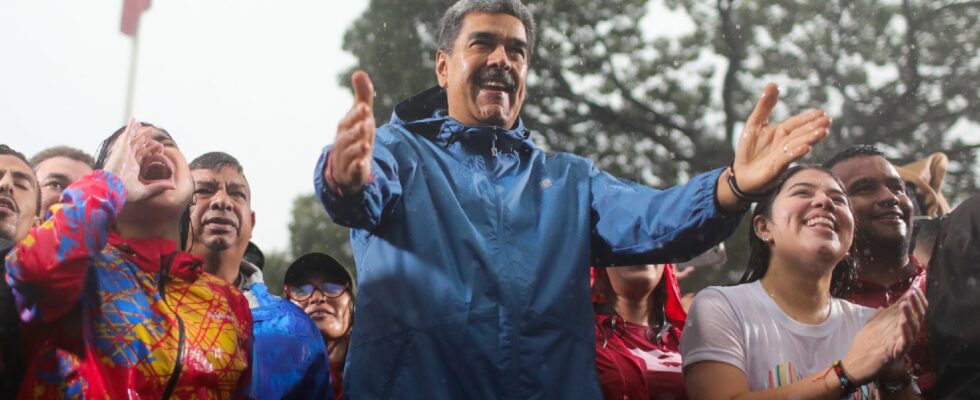It is a soap opera that has lasted for more than two weeks and that Nicolás Maduro hopes to close with a decision from the Supreme Court. “Tomorrow, the fighting cock [NDLR : lui] “will go to the Supreme Court of Justice (TSJ),” the Venezuelan dictator declared on August 8, resuming the nickname he had given himself during the electoral campaign. “We want peace, tranquility, that is why I have filed this contentious appeal with the TSJ [NDLR : le 1er août]”There were two days of hearings, all the candidates and all the parties were summoned, and it’s my turn,” he told his supporters who came to support him during a demonstration in Caracas on Thursday, August 8.
It all started on July 29. The day after the vote, the National Electoral Council (CNE) – responsible for reporting the results – remained suspiciously silent. Each side claimed victory. Faced with the silence of the institution, sensing the electoral scam looming, the population took to the streets to express their anger. Nicolás Maduro’s curt response. Hugo Chávez’s successor sent him the Bolivarian National Guard – the military body responsible for enforcing public order. To date, the clashes have caused the deaths of 24 people, according to a report by human rights organizations.
The CNE gives its verdict after five days of uncertainty. To everyone’s surprise, victory is attributed to Nicolás Maduro, who would win 52% of the vote, against 44% for the opposition candidate Edmundo González Urrutia, the replacement for María Corina Machado. The institution will not give further details, justifying itself by saying that it was the victim of a cyberattack. For Nicolás Maduro, the person responsible is none other than Elon Musk, owner of X. The outgoing president also suspended access to the social network throughout the country for ten days on Thursday, August 8.
Maduro’s iron fist tightens its grip
“No one will silence me, I will face the espionage of the technological empire. Elon Musk […] “violated all the rules of the social network X and violated them by inciting hatred and fascism,” attacked the Venezuelan leader, whose enmity with the pro-Trump billionaire is well known. The latter, since the unrest in Venezuela, has continued to relay content inciting an uprising against Nicolás Maduro, while publishing criticism and personal attacks against the dictator.
Venezuelans nevertheless believed in a relaxation of the authoritarian apparatus. Especially when, before the vote, President Maduro – in office since 2013 – had promised “free and transparent” elections, according to the American newspaper. Forbes. But the first worrying signals emerged when the candidacy of María Corina Machado was deemed inadmissible by the Supreme Tribunal of Justice (TSJ) – also known as the Supreme Court – last January.
The judicial institution is returning to the forefront at the request of the Venezuelan president, who is keen to reinforce the CNE’s decision and could bury any hope of a democratic outcome. Edmundo González Urrutia has already announced that he will not appear before the TSJ. Summoned on Wednesday, August 7, he expressed himself on Twitter in these terms: “If I go to the Supreme Court, I will endanger not only my freedom but also, more importantly: the will of the Venezuelan people expressed on July 28.”
“Everything indicates that the judicial process is a kind of ambush against Edmundo Gonzalez. We start from the point that the judiciary is controlled by Maduro, as is the electoral power,” Giulio Cellini, director of the political consultancy Logconsultancy, analyses for AFP. Until now, the discreet 74-year-old diplomat has been living in hiding, as has María Corina Machado. But the Venezuelan opposition leader said in an interview with AFP on August 9 that she will offer “guarantees and safe conduct” to President Nicolás Maduro if he voluntarily leaves power after his contested re-election.
Maria Corina Machado also stressed that “international forces are jointly responsible for what is happening in Venezuela,” calling for greater involvement from the international community. Washington has already warned against any attempt to arrest opposition leaders, while two of them, Williams Davila and Américo De Grazia, were arrested, AFP reported on August 8. On the same day, Brazil, Colombia and Mexico insisted on the need for Caracas to make public the presidential election minutes.
On Monday, August 5, after announcing the receipt of all the minutes submitted by the CNE, the TSJ announced that it was giving itself a period of “15 days, extendable” to make its decision. With this procedure, Nicolás Maduro “implicitly admits that no one believes in the proclamation (of the CNE), to the point that he is asking for the intervention of another power to certify his victory,” said Perkins Rocha, also speaking to AFP. The opposition lawyer added: “Mr. Maduro knows that he can count on a TSJ on its knees before him.”
